New course for preschool teachers encourages children’s love for gardening
Online, video-based course shows how to successfully implement Early Childhood Learn, Grow, Eat and Go! curriculum
The Junior Master Gardener program of the Texas A&M AgriLife Extension Service has added the “Implementing the Early Childhood Learn, Grow, Eat and Go! Curriculum” course to its AgriLife Learn platform as a way to help instructors successfully teach their gardening-based curriculum in the preschool classroom.
“This course will overview this popular school garden, nutrition and physical activity unit specifically developed for students in pre-K through kindergarten,” said Randy Seagraves, AgriLife Extension program specialist and international Junior Master Gardener program curriculum director, Bryan-College Station.
The purpose of the course

Seagraves said as a complement or preview to the Early Childhood Learn, Grow, Eat and Go! curriculum, the teacher-friendly course will prepare those implementing the curriculum to lead its lessons and activities, as well as use the many teacher resources that support it.
“If you are a preschool, Head Start or kindergarten teacher, or any other early childhood educator, you will love this fun, video-based course that will help you become familiar with the program and see this curriculum in action,” he said.
The course costs $18 and can be found at https://JMGkids.us/earlychildhood/course/. It is designed to:
- Empower early childhood teachers to become very familiar with Early Childhood Learn, Grow, Eat and Go! by seeing the curriculum in action in a preschool environment.
- Equip early childhood teachers to effectively implement lessons, activities and dynamic curriculum resources.
- Engage parents and families to be a part of this garden-based program and maximize benefits to students who will carry the lessons home with them.
Those using the curriculum will be introduced to daily lessons with weekly resources. They can select four featured lessons and activities each week to see the curriculum taught in actual preschool classrooms.
Jodi Nerren, AgriLife Extension specialist in early childhood health and safety, Bryan-College Station, said the course can be used to fulfill training requirements from Child Care Regulation of Texas Health and Human Services, providing two clock hours of credit under the topic of Age-Appropriate Curriculum. She said it also aligns with Texas’ Core Competencies for Early Childhood Practitioners and Administrators, 3.2 Curriculum and Standards.
“As with all our online courses for early childhood professionals, those who complete this course will receive a certificate and, for users who meet certain criteria, that certificate will automatically upload to their accounts in the Texas Early Childhood Professional Development System Workforce Registry,” she said.
The Early Childhood Learn, Grow, Eat and Go! curriculum
The curriculum provides rich, interesting lessons, as well as group activities and a host of proven resources crafted around weekly plant themes. It is a four-week curriculum with these specific themes:
• Week 1: Plant Needs and Plant Parts.
• Week 2: Seeds and Roots.
• Week 3: Stems and Leaves.
• Week 4: Flowers and Fruit.

The curriculum was developed specifically for students 4-5 years old. It combines and novel ways to engage parents, schools and the community.
“This is the most age-specific group of children for which we have developed a Junior Master Gardener curriculum,” Seagraves said. “And it can potentially make significant changes in youth perceptions about food and nutrition.”
He said when our youngest students are engaged and active hands-on learners in a school gardening project, they not only grow plants but also grow academically, socially and emotionally.
To learn more about the curriculum offerings of the Junior Master Gardener program, visit https://jmgkids.us/.


